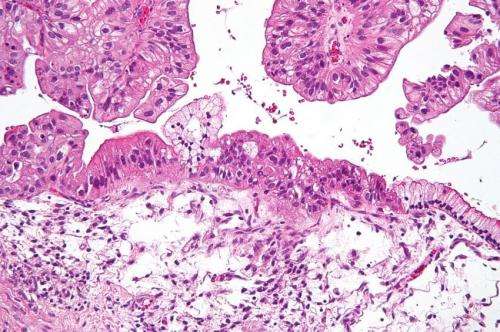Intermediate magnification micrograph of a low malignant potential (LMP) mucinous ovarian tumour. H&E stain. The micrograph shows: Simple mucinous epithelium (right) and mucinous epithelium that pseudo-stratifies (left - diagnostic of a LMP tumour). Epithelium in a frond-like architecture is seen at the top of image. Credit: Nephron /Wikipedia. CC BY-SA 3.0
In a study involving more than 31,000 women with cancer-causing mutations in the BRCA1 or BRCA2 genes, researchers at The Basser Center for BRCA, the Abramson Cancer Center, and the Perelman School of Medicine at the University of Pennsylvania identified mutations that are associated with significantly different risks of breast and ovarian cancers. Authors say the results - which show that some mutations confer higher risks of breast cancer, while other mutations show higher risks of ovarian cancer - may lead to more effective cancer risk assessment, care and prevention strategies for health care providers and carriers. The results are published in the April 7 issue of JAMA.
"We've made a lot of progress toward understanding how to reduce the cancer risks associated with inherited mutations in BRCA1 or BRCA2 mutations, but until now, little has been known about how cancer risks differ by the specific mutation a woman has inherited," said Timothy R. Rebbeck, PhD, professor of Epidemiology, and associate director for Population Science at Penn Medicine's Abramson Cancer Center. "The results of this study are a first step in understanding how to personalize risk assessment around a woman's specific mutation, which can help guide carriers and providers in the cancer prevention decision making process."
Rebbeck and colleagues evaluated cancer diagnoses for 19,581 carriers of BRCA1 mutations and 11,900 carriers of BRCA2 mutations. The team then analyzed whether the BRCA1 and BRCA2 mutation type or location was correlated to breast and/or ovarian cancer risk. He and his co-authors identified regions of both BRCA1 and BRCA2 that, when mutated, confer higher risks of ovarian cancer, and other regions that confer higher risk of breast cancer.
Previously, a woman with a BRCA1 mutation would have been thought to have a 59 percent risk of breast cancer and a 34 percent risk for ovarian cancer, up until age 70. However, the new research suggests that women who carry a specific subset of BRCA mutations most commonly present in the Ashkenazi Jewish population have a higher risk of breast cancer (69 percent) and a lower risk of ovarian cancer (26 percent), for example. The important question that remains is whether these differences will change the decisions a woman makes about preventive surgery or other behaviors.
"With these new findings, we've gained knowledge of mutation-specific risks which could provide important information for risk assessment among BRCA1/2 mutation carriers," said senior author Katherine L. Nathanson, MD, associate professor of Medicine and director of Genetics in the Basser Research Center for BRCA at Penn's Abramson Cancer Center, "Additional research is needed to determine the absolute risks associated with different mutations, and how those differences might influence decision making and standards of care, such as preventive surgery, for carriers of BRCA1 and BRCA2 mutations."
More information: JAMA, doi:10.1001/jama.2014.5985
Journal information: Journal of the American Medical Association
Provided by University of Pennsylvania School of Medicine




















